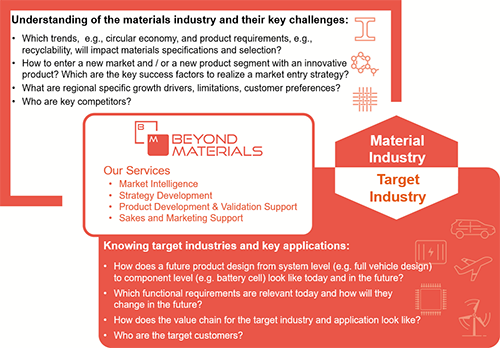The deployment of renewable energy is expected to further increase with the introduction of support systems by national governments, technological advancements, and other developments.
For renewable energy businesses, MC has set a target aiming to double renewable power generation capacity by FY2030 compared to FY2019 . Embracing the trend that renewable energy will become the world's main energy source, MC's policy is to expand investment and initiatives from power generation to retailing centered on renewable energy. This is exemplified through MC’s 2020 acquisition of the Dutch company Eneco, which operates as an integrated energy business throughout Europe. By combining digital technologies with environment-friendly energy sources, including renewable energy, MC aims to help ensure a stable supply of power while also providing customers with new value, such as the supply-demand adjustment function. In addition, through its activities in the field of hydrogen, which is seen as a next-generation fuel, MC aims to contribute to the realization of a decarbonized society while also increasing its corporate value.
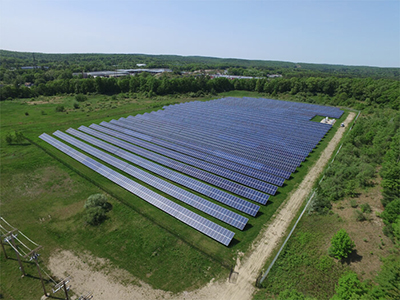
Dutch integrated energy company Eneco operates power generation businesses, power and gas trading businesses, power and gas retail businesses, and district heating businesses focused in the Netherlands, Belgium, and Germany with renewable energy at its core. With a solid customer base that is the third largest in the Netherlands, Eneco has approximately 2,240 MW of renewable energy assets, which include the ones under construction status. Since 2007, Eneco has developed renewable energy ahead of its competitors and has established a position as a green brand by providing consumers with 100% green energy (including the use of green certificates) since 2011. Eneco is an innovative company that has set customer-focused services as an objective since very early on. In addition, in 2021, Eneco announced its One Planet Plan, which aims to achieve carbon neutrality by 2035, covering CO2 emissions not only from its own activities (Scope 1 and 2) but across its value chain (Scope 3) as well, which includes power, gas retailing, and supplying heat to businesses and households. Eneco is also recognized both domestically and internationally as a company actively working toward measures to address climate change.
Prior to the acquisition of Eneco, MC and Eneco contributed to the deployment and expansion of renewable energy in Europe, working together on three European offshore wind projects along with a battery storage project in Europe. MC aims to contribute to the establishment of a sustainable society through the simultaneous realization of the three types of value—economic, societal, and environmental—by utilizing Eneco's technology and expertise to accelerate the development of renewable energy inside and outside of Europe. Also, by combining Eneco's customer base and MC's various products and services, MC aims to improve services related to energy management for Eneco's customers and promote the EX and DX strategies outlined in Midterm Corporate Strategy 2024.
The power business is facing a transition period brought about by the increase in small-scale decentralized power sources and developments in storage batteries and digital technology that have arisen with the dissemination of renewable energy. Under such circumstances, MC, along with its partner Chubu Electric Power, aims to contribute to solving societal issues such as the transition to a decarbonized society and the preservation of the global environment. Both companies will do so by supporting the infrastructure of people’s lives through the growth of the innovative integrated energy company Eneco, which provides customer-focused services that utilize renewable energy development along with digital technology.

Currently, it is said that the transportation sector accounts for approximately 20% of global CO2 emissions, and the reduction of CO2 emissions as well as of the use of fossil fuels in the automobile industry pose significant issues. As EVs become increasingly popular due to a low environmental impact while in operation, we are trying to contribute to the realization of a decarbonized society through business activities that focus on EVs and batteries.
ALTNA Co., Ltd. was established in July 2024, as a joint venture with Honda Motor Co., Ltd. (Honda), and is striving to create new businesses in light of anticipated growth in the electric vehicle (EV) market toward a decarbonized future society. By combining Honda's control and connected technologies for EVs and batteries and MC’s energy business know-how, which extends to administration of battery energy storage and smart-charging operations, ALTNA will strive to introduce and develop new business model that reduces Total Cost of Ownership (TCO) for EV users and contribute to realizing the long-term utilization of EV batteries. Details about these businesses are explained below.
In cooperation with vehicle owners of leasing companies, ALTNA will retain the ownership of the batteries of EVs and lease them during the lease period of the vehicles. Continuous monitoring of the batteries usage will realize to long-term use up to leasing used cars. By recovering and utilizing the batteries for storage battery business after the end of automotive use, ALTNA will set lease prices based on long-term use and reduce EV usage costs.

ALTNA supplies power by using repurposed in-vehicle batteries as system storage batteries. In response to the growing demand for batteries in order to promote the spread of renewable energy, ALTNA will operate a resource-recycling grid storage plant by utilizing the repurposed in-vehicle batteries and maximizing the use of storage facilities by assuming that the batteries are replaced. Moreover, ALTNA will ensure appropriate recycling of its end-of-life grid storage batteries to realize resource circulation-oriented manufacturing.

Utilizing advanced energy control technology, ALTNA provide a smart charging service that optimizes electricity costs for EV users by automatically charging EVs during off-peak hours on the grid by simply connecting a charger to the vehicle. In addition, ALTNA’s charging plans will contribute to the increased use of green (renewable) energy by charging EVs during times when there is a surplus of renewable energy on the power grid.
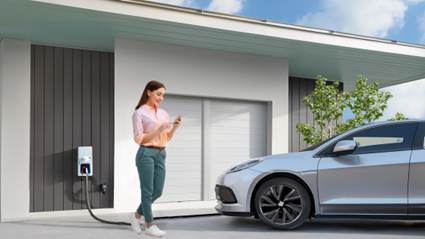

<Chiyoda’s SPERA Hydrogen>
MC is focusing on low-carbon hydrogen / ammonia which are seen as promising next-generation energies, and is proceeding study with our partners at each stage of the low-carbon hydrogen / ammonia supply chain, “production,” “transportation” and “storage”.
For the “production” stage, MC is studying participation in ExxonMobil’s planned low-carbon hydrogen / ammonia production project in Baytown, Texas, USA, as well as the offtake of low-carbon ammonia, jointly with Idemitsu Kosan.
This project aims to start production of low-carbon hydrogen (approximately 900,000 tons per year) and low-carbon ammonia (over 1 million tons per year) by 2029 and is expected to be the world's largest of its kind. This planned project will produce virtually carbon-free hydrogen with approximately 98% of carbon dioxide (CO2) removed and low-carbon ammonia.
For the “transportation” and “storage” stage, MC is assessing the partial conversion of its LPG terminal (Namikata Terminal) into an ammonia terminal and supply low-carbon ammonia for various industrial applications, mainly in the Shikoku and Chugoku regions. For efficient operation of ammonia carriers, MC is also studying alignment with ammonia terminal which Idemitsu Kosan aims to establish in Shunan region, Yamaguchi Prefecture.
The use of hydrogen as a source of energy is gaining attention as a low-carbon alternative. MC participated in the New Energy and Industrial Technology Development Organization (NEDO)-subsidized Demonstration of Unused Energy-Based Hydrogen Supply Chain Using Organic Chemical Hydride Method*This demonstration project is an initiative for the establishment of the mass transportation of hydrogen from overseas and supply technology that will be necessary for the full-scale introduction of hydrogen power generation for the power generation business in 2030 to realize phase two of METI's Strategic Road Map for Hydrogen and Fuel Cells (published in June 2014, revised edition published in March 2016). In 2020, MC implemented a demonstration project transporting hydrogen from Brunei to Japan. Based on the Paris Agreement that was adopted at COP21 in December 2015, with the increasing need to reduce future greenhouse gas emissions, MC will contribute to the realization of utilizing hydrogen, which does not emit CO2 during combustion, in the field of large-scale power generation.* project, which came to a successful conclusion in December 2020, and have now entered the commercial project development phase. MC is currently proactively working to establish an international hydrogen value chain.
In March 2020, MC along with five private Singaporean companies (City Energy (formerly City Gas), Jurong Port, PSA Corporation Limited, Sembcorp Industries and Singapore LNG Corporation) and Chiyoda Corporation executed a memorandum of understanding (MOU) aimed at the realization of a sustainable hydrogen economy in Singapore in the presence of Singapore government officials.
In addition, MC executed an MOU in July 2021 with the Port of Rotterdam Authority, Chane
(formerly Koole Terminals) and Chiyoda for the joint study of commercial-scale imports of hydrogen to the Port of Rotterdam. In October 2021, MC signed an MOU with Sembcorp and Chiyoda to establish a strategic alliance aimed at exploring the feasibility and implementation of a commercial-scale, decarbonized hydrogen supply chain in Singapore. Further, in October 2022, we made a new agreement to further examine the technical and commercial aspects of the hydrogen supply chain business.
ENEOS Corporation and MC have agreed to undertake a joint feasibility study aimed at commercializing SAF and other next-generation fuels in Japan.
By leveraging ENEOS’ manufacturing technologies and distribution networks, together with MC’s global expertise in raw material sourcing and marketing capabilities, MC will formulate a basic strategy that takes into account the maturity of various SAF manufacturing technologies and the necessary time for commercialization. ENEOS and MC will proceed with the study based on the following three approaches:

CarbonCure英語版用画像
MC recognizes that Carbon Capture and Storage, and Carbon Capture Utilization and Storage (CCUS) will play a major role in achieving the goals of the Paris Agreement.The International Energy Agency (IEA) has stated that CCUS must be used to reduce roughly 1.5 billion tons of CO2 emitted in 2050 in order to achieve the 1.5°C target. CCUS is a field that spans multiple industries, from those that are the source of CO2 emissions to those that produce end products such as fuel and chemical as well as construction materials. Therefore, MC recognizes CCUS as a business opportunity to demonstrate its comprehensive capabilities as a company that interacts with many industries. To take advantage of this business opportunity, MC will promote the commercialization of CCUS.
For CCU, MC is working on short-term initiatives in the construction materials field where there are already commercialized products (such as concrete) and technology. It is also working on medium to long term initiatives in the petroleum products and chemicals field where further research and development is necessary for demonstration (such as jet fuel and synthetic fibers). Through the above initiatives, MC is developing new businesses and technology through investment and collaboration with various domestic and international corporations. In addition, MC is accelerating efforts to build overseas CCS value chains, etc.
Furthermore, the IPCC*Intergovernmental Panel on Climate Change. The IPCC is an intergovernmental organization established by the United Nations Environment Programme (UNEP) and the World Meteorological Organization (WMO) that collects and organizes scientific research regarding climate change.* identifies that in order to achieve the 1.5°C target, in addition to reducing CO2 emissions from sources, Carbon Dioxide Removal, which removes CO2 remaining in the atmosphere, is necessary. MC will grasp this as a business opportunity and promote initiatives utilizing various technologies, including Direct Air Capture (DAC), a technology that captures CO2 directly from the atmosphere, which is considered to be a typical method of Carbon Dioxide Removal.
MC is working in the field of construction materials where technological maturity is high and where commercialized projects already exist. There are many kinds of construction materials, such as ready-mixed concrete, precast concrete (concrete block products) and aggregates (raw material of concrete). As a suitable CO2 reduction method is required for each, MC aims for the maximum reduction in CO2 by approaching each product with a combination of various technologies and collaborations with corporations (Green Concrete Concept).
CarbonCure Technologies Inc. is a Canadian company that possesses technology for fixing CO2 into concrete building materials. MC has made an equity participation in CarbonCure and has a business partnership to expand businesses related to CarbonCure's technology. CarbonCure's carbon recycling technology fixes and utilizes CO2 into fresh concrete during production, reducing CO2 emissions by reducing the amount of cement used.
The strength and dependability of CarbonCure’s concrete is the same as traditional concrete, and it is currently widely used commercially, mainly in North America.
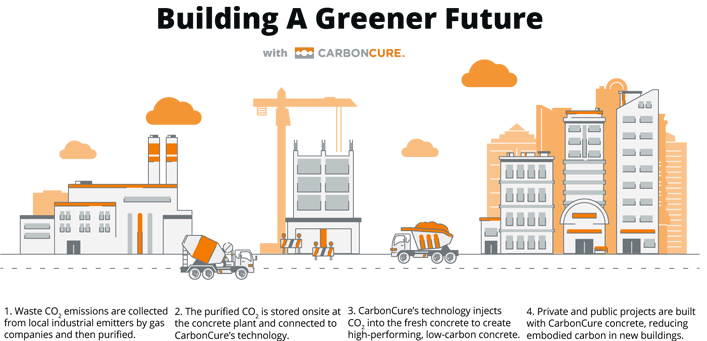
With CCUS as a medium- to long-term initiative, MC is addressing the petroleum and chemicals field where further research and development is required. Specifically, MC, along with the University of Toyama, Chiyoda Corporation, Nippon Steel Engineering Co., Ltd, Nippon Steel Corporation and HighChem Company Limited, were chosen in NEDO’s publicly-offered commissioned projects, “Carbon Recycling and Development of Next-Generation Thermal Power Generation/Development of Technology for the Reduction of CO2 Emissions and the Effective and Practical Use of CO2/Development of Technology for the Use of CO2 in Chemical Materials,” and the organizations are working on the research and development of a method to produce paraxylene, which is a material used in clothing and PET bottles, from CO2. In this initiative, MC, as a company with one of the world's highest transaction volumes in paraxylene, is responsible for testing and reviewing commercial feasibility using its global network. Due to its composition, paraxylene can fixate CO2 while limiting the amount of hydrogen as material. MC recognizes that the potential for CCU paraxylene is significant, both from an economic and environmental perspective. It is expected that demand for clothing will rise with the increase in the global population. Therefore, to meet the demand for polyester that cannot be covered with recycling alone, MC aims to substitute existing petroleum-based paraxylene with sustainable paraxylene produced from CO2.
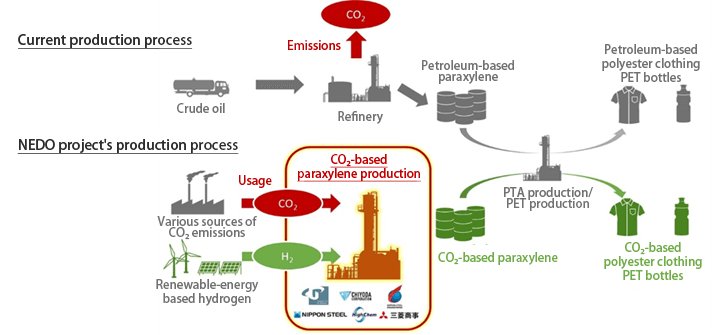
MC, as a joint venture partner of the Tangguh LNG Project in Papua Barat Province, Indonesia, led by bp, the project operator, proceeded with a Plan of Development (POD) that includes a CCUS project. This POD was approved by SKK Migas (Special Task Force for Upstream Oil and Gas Business Activities Republic of Indonesia) in 2021, and aims to recover a cumulative total of approximately 25 million tons of CO2 emitted from natural gas production and reduce CO2 emissions by reinjecting and storing it in the Vorwata gas field under production, while improving natural gas production efficiency and increasing its production (known as Enhanced Gas Recovery, or CO2-EGR). As a result, the total CO2 emissions of this project can be halved. The Front-End Engineering and Design (FEED) started in 2022, and the natural gas production and CCUS project are estimated to start from 2026, subject to a final investment decision.

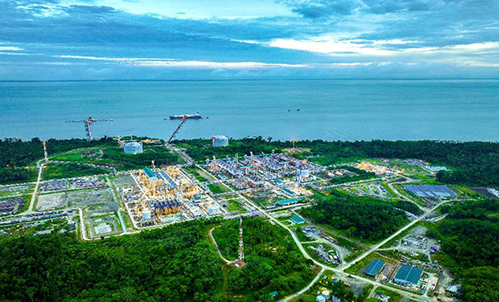
MC is conducting a feasibility study on building an overseas CCS value chain through Oceania CCS Project and Northern Offshore Malay Peninsula CCS Project, both of which are awarded as Advanced CCS Projects for the FY2024 by the Japan Energy and Metals National Corporation (“JOGMEC”).
In Oceania CCS Project, Mitsubishi Corporation, Nippon Steel Corporation, ExxonMobil Asia Pacific Pte. Ltd., Mitsubishi Chemical Corporation and Mitsubishi Corporation Clean Energy Corporation will conduct research on the capture of CO2 emissions from Ise Bay/Chubu area, transport and store the captured CO2 in the Asia-Pacific region, including Australia, Malaysia and Indonesia. In Northern Offshore Malay Peninsula CCS Project, Mitsubishi Corporation, ENEOS Corporation, JX Nippon Oil & Gas Exploration Corporation, JFE Steel Corporation, Cosmo Oil Co., Ltd., Nippon Shokubai Co., Ltd., and PETRONAS CCS Solutions Sdn Bhd will conduct research on the capture of CO2 emissions from Tokyo Bay area, transport and store the captured CO2 in Northern Offshore of Peninsular Malaysia. The study in both projects will be held on CO2 separation, capturing, transport and storing, aiming to commence storing by FY2030.
MC and the Swiss company South Pole, which is one of the world’s largest carbon credit developers, have jointly established the NextGen CDR AG (“NextGen”) as a business venture to handle the procurement and sales of carbon credits derived from Carbon Capture, Utilization and Storage (CCUS) and other innovative carbon removal technologies.
In order to achieve the goals set forth in the Paris Agreement and keep global warming below 1.5°C, it is considered crucial to adopt carbon removal technologies such as CCUS. However, there are multiple challenges that need to be addressed before these technologies can be implemented in society on a large scale, including further technological innovation and cost reduction. MC is working to solve these challenges by providing a new source of revenue through credit sales to credit suppliers. To achieve this goal, we are bringing together carbon credit buyers and establishing long-term carbon credit offtake agreements, with the aim of promoting the widespread implementation of these technologies, which are still in their infancy.
Overview of Project (NextGen CDR AG)

MC and Nippon Yusen Kabushiki Kaisha (NYK) have jointly acquired a 40% interest in Australian Integrated Carbon Pty Ltd (AIC), which is engaged in the sale of carbon credits. The credits are obtained through CO2-sequstrations achieved in the regrowth of Australia’s native forests through a process called human-induced regeneration, which is an established methodology in Australia. It employs new land-management practices to facilitate the regeneration of native woodlands that have been lost over the past few centuries due to clearing and overgrazing. The amount of CO2 stored in the regenerated forests is officially certified as Australian Carbon Credit Units by the Australian Government. AIC aims to contribute to capturing up to 5 million tons of CO2 emissions per year, and a cumulative total of 100 million tons by 2050,through its growing portfolio.
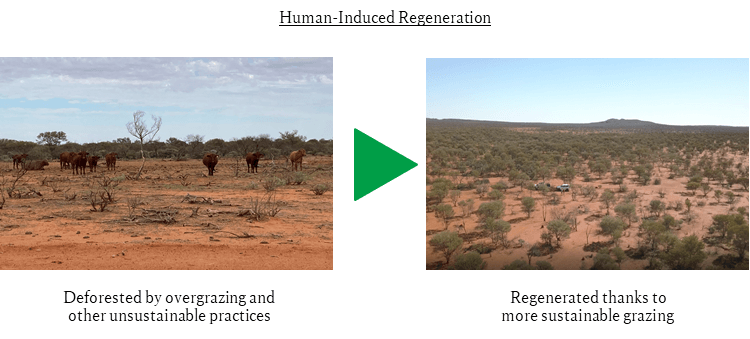
We will make the most of our vast connections across various industries, and starting with green logistics and green buildings, we will promote carbon reductions and decarbonization through businesses in various fields.
MC is the first company in Asia to participate in Breakthrough Energy Catalyst (BEC), a program dedicated to accelerating the application of innovative decarbonization technologies in society.
BEC is a brand new model that was launched as part of Breakthrough Energy, a network of initiatives founded in 2015 by global philanthropist Bill Gates. The BEC program provides investment and other support for individual projects based on new decarbonization technologies for which research and development have already been completed.
MC is active in the renewable energy field and has begun to explore the introduction of next-generation energy sources, such as hydrogen, ammonia, and methanation. We recognize the need to use new technologies and innovations to meet the global challenge of transitioning to a carbon-neutral society.
In addition, BEC acts as a ‘Catalyst’, organically linking funds from private sector partners and philanthropic organizations, product off-take support for consumers of green products, and assistance from government agencies. Through these activities, BEC is establishing a framework to support the scaling up of projects based on innovative decarbonization technologies that are nearing commercialization, contributing to the realization of a carbon-neutral society.
The current five focus areas for BEC are (1) clean hydrogen production (and related infrastructure), (2) long-duration energy storage (LDES), (3) sustainable aviation fuels (SAF), (4) direct air capture (DAC), and (5) green manufacturing industries (steel, cement, plastics, etc.). In the future, BEC may expand its focus to include other technologies that are also important for decarbonization. MC also considers these technologies vital to its own EX Strategy and its Roadmap to a Carbon-Neutral Society.
Our participation in BEC will allow us to support the adoption of innovative technologies that will accelerate the transition to a carbon-neutral world and contribute to further reductions in environmental impact without compromising people’s well-being.
MC will contribute to the transition to a carbon-neutral society by making full use of the expertise and networks that it has cultivated in Japan and throughout Asia to collaborate with other BEC partner companies who represent a broad range of industries, including steel, aviation, and finance.
MC and Air Water Inc. are jointly conducting a demonstration trials in Hokkaido using LNG-powered trucks (“LNG trucks”) and compact portable LNG filling facilities (“LNG filling boxes”).
The project addresses the challenges of electric vehicles (“EVs”) and hydrogen fuel cell vehicles (“FCVs”) for heavy-duty trucks, such as limitations in driving range and payload capacity, as well as their lengthy charging/refueling times. LNG trucks are the practical and immediate solution towards achieving a carbon-neutral society.
LNG trucks are capable of continuous long-distance travel exceeding 1,000 km, a range currently challenging for EVs and FCVs. Furthermore, LNG trucks are expected to reduce CO₂ emissions by approximately 10% or more compared to conventional diesel trucks.
These LNG trucks have driven a cumulative total of over 2 million kilometers since the commencement of the demonstration trials in April 2022. In November 2022, CO2 emissions were reduced even further by blending liquefied bio-methane (LBM) with LNG. LBM is produced from biogas derived from livestock manure in Hokkaido.
MC will continue to participate in these demonstration trials with the goal of introducing LNG trucks into society as a way of reducing CO2 emissions resulting from heavy-duty truck logistics.
The e-commerce market is expanding year after year due to changes in Japan’s social environment, such as the declining birthrate, aging population, the increase in the number of double-income households and the spread of COVID-19. Furthermore, while the volume of goods continues to increase, labor shortages are becoming a serious issue for logistics.
In cooperation with its subsidiary Lawson, Inc., in April 2019, MC began the service Smari, which uses Lawson's existing logistics network to accept non-face-to-face shipment of products sold on online flea markets, etc., as well as return and rental items, which are increasing with the expansion of the e-commerce market. As of 2024, this service has expanded to roughly 3,000 Lawson stores in the Tokyo, Kansai and Chubu regions, and has also been expanded to include locations such as stations and so on.
At around 14,500 Lawson stores across Japan, which are the main locations for Smari, products are delivered around seven to eight times every day from the dedicated distribution center. SMARI is an initiative where drivers who have finished their delivery pick up packages from the delivery boxes and deliver them using their truck's spare space. Smari is an eco-friendly business model that limits new GHG emissions by using the existing logistics network's return trips. Also, as it utilizes the existing logistics network, there is no need for additional employees. As it is a system where the shipment process is completed without face-to-face contact, stores can expect a reduction in the time at checkouts. Users do not have to complete a package slip or wait at the cash register and can easily complete the posting procedures in under a minute. Simultaneously, e-commerce companies and other shippers can expect an increase in customer satisfaction due to diversification in the methods for returning and posting products.
Since 2023, MC has been working in partnership with delivery box manufacturers to develop a new service that will allow customers to send packages from their home delivery boxes. By making it easier to ship and return packages from customers's homes, as well as to further promote the adoption of delivery boxes, we will help to address various societal and environmental issues, including the problems that are expected to occur in Japan's logistics sector in 2024.

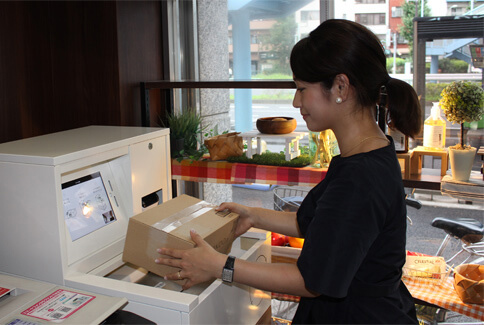

In June 2022, MC's affiliate company, Olam Group Limited (Olam), officially launched Terrascope, an end-to-end smart carbon management platform that enables companies to calculate and measure the GHG emissions associated with business activities as well as manage their initiatives to reduce emissions. Terrascope has been adopted on a global basis, including in the Japanese market, where Olam officially began providing service sin June 2023. One of the key features of Terrascope is the improvement of efficiency through digitization, such as the rapid and accurate calculation of Scope 1, 2, and 3 GHG emissions to identify potential hotspots through AI-based smart systems. Terrascope is expanding to industries and sectors beyond Olam's core business of food ingredients, basic foods, and living essentials. As one example in Singapore, the company has started to work with the country's largest bank, DBS Bank. Please visit the company’s website for more information on its initiatives
DREAM, an MC subsidiary that forms and manages private real estate funds for domestic and international investors, has formulated a Sustainability Vision (vision for 2030) to meet future stakeholder needs as a real estate management pioneer, and to continue to be a corporation that contributes to the conservation of the global environment and sustainable economic and social development. DREAM is implementing sustainability management that aims to promote a real estate management business that considers people and organizations as well as the global environment and society.
DREAM Private REIT Inc. (DPR) has a top-class asset size in Japan focused mainly on logistics centers. For the 2024 GRESB*1GRESB
“GRESB” refers both to an annual benchmarking assessment and management organization used to evaluate the environmental, social, and governance (ESG) data of real estate companies and funds. GRESB was established in 2009 by a group of major European pension funds who played leading roles in the launch of the Principles for Responsible Investment (PRI). While GRESB originally stood for “Global Real Estate Sustainability Benchmark,” it has since come to be used as a general term due to the scope of GRESB assessments having expanded to encompass areas such as infrastructure.*1 real estate assessment, DPR was awarded the highest possible rating of “5 Stars,” as well as its 7th consecutive “Green Star” for outstanding performance.
DREAM has acquired multiple real estate environmental certifications for the properties owned by the private funds and private REITs it manages, with CASBEE Real Estate Assessment Certification*2CASBEE Real Estate Assessment Certification
Comprehensive Assessment System for Built Environment Efficiency (CASBEE) is a method for evaluating and rating buildings' environmental performance. The system comprehensively assesses buildings' environmental performance, including aspects that reduce environmental impacts such as energy-efficiency, resource conservation, recycling efficiency and considerations for the surrounding landscape.*2 ,BELS Certification*3BELS Assessment
Building-Housing Energy-efficiency Labeling System (BELS) is used for buildings that require such information to be provided to real estate business operators and other such parties under the Act on the Improvement of Energy Consumption Performance of Buildings (Building Energy Efficiency Act), which came into force in April 2016.*3 ,Tokyo Metropolitan Small to Medium Scale Low Carbon Model Building and ResReal/ResReal Flood Certification*4Tokyo Metropolitan Small- to Medium-Sized Low-Carbon Model Building
Tokyo Metropolitan Small- and Medium-Sized Low-Carbon Model Buildings are those classified as A1 or higher as per the Low-Carbon Building Benchmark, the standard for buildings with low CO2 emissions. This standard was published by the Tokyo Metropolitan Government in May 2012 to enable the evaluation of CO2 emissions in the real estate market. The Tokyo Metropolitan Government publishes the names of small- and medium-sized tenant buildings which are both a) classified as A1 or above (a measure of low CO2 emissions) and b) are actively engaged in energy conservation as "Small- to Medium-Sized Low-Carbon Model Buildings."*4, and ResReal Flood*5ResReal Flood
ResReal is a certification offered by the Japan Real Estate Institute. It is Japan’s first certification program based on the quantification and visualization of the resilience (strength, flexibility, recovery potential, and resistance) of properties against natural disasters. Properties are certified on the basis of robustness (location and building), redundancy, readiness, and substitutability. ResReal factors in both “hard” resilience factors, such as a property’s location and building performance, as well as “soft” factors, including stockpiles of emergency supplies and disaster preparedness training. The flood damage version of ResReal comprehensively quantifies the resilience of a property against floods.*5 status having been attained by the private funds and private REITs managed by DREAM.
By managing real estate, DREAM will continue to contribute to maximizing society's well-being in the future.
Please check the link below for data on Diamond Realty Management Inc. Green Building.

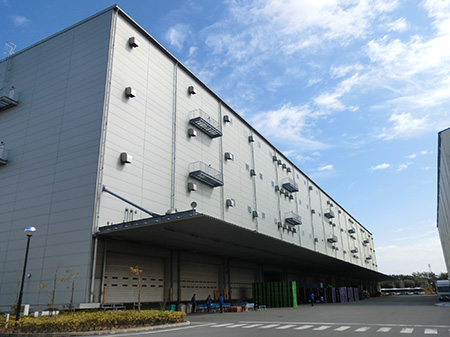
As a result of changes in the needs of society and industry, including the move to a decarbonized world, requirements for new product designs in the electric vehicle (EV) and lithium-ion battery (LiB) sectors are increasing in their sophistication and diversity. This is suddenly raising the expectations for functional materials used for these applications. Based on their shared values to contribute to the realization of a sustainable society, MC and FEV Consulting GmbH provide marketing and product development services to the materials industry through the joint venture company Beyond Materials. It will serve as a bridge between users of materials in the automotive and other sectors along with contributing to global and sustainable growth in the materials industries. The project also furthers Beyond Materials' aim of contributing to sustainable growth in global materials markets and helping MC to achieve its mission to build net-zero, circular economies.
